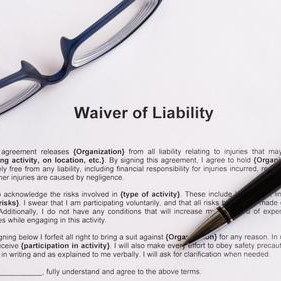Liability Waivers in Maryland: Are They Enforceable?

If you have paid a visit to the local gym or community swimming pool, taken sky diving or trapeze lessons, gone scuba diving, bungee jumping, zip lining or engaged in any activity which poses a risk to life and limb, you probably had to sign a liability waiver or a “pre-injury” release. Any such document generally states that you are aware the activity you are about to undertake is dangerous and could result in personal injury or even death - and that you engage in the activity at your own risk. The waiver then states that you release the company from any claims for injuries, even if they are caused by the negligence of the company. Many of these liability or pre-injury releases also provide that you agree to indemnify and hold harmless the company from any claims arising from your use of the company’s facilities or from your participation in the activity.
These liability waivers are known as “exculpatory clauses” or “pre-injury releases.” Unless the Maryland legislature enacts a law which prohibits them (none on the books at this point in time), at least for now, such clauses are valid and enforceable under state law so long as the company issuing the waiver is a commercial establishment or business. If you sign such a waiver for the benefit of a commercial business, then under current Maryland law you are prevented from suing for personal injuries which you sustain while engaging in the activity.
The law is less clear in cases where the organization is not a commercial establishment or business. If the organization issuing the waiver is a government agency operating a facility such as an ice skating rink or a golf course, or if it is a non-profit corporation, (i.e., the Boy Scouts or the Boys and Girls Clubs), or a community association, then these kinds of liability waivers may not be enforceable. In Maryland, the law is not clear if the organization requiring the waiver is a government agency or a non-profit corporation.
In August 2012, the Maryland Court of Special Appeals decided in Rosen v. BJ’s Wholesale Club, Inc. to carve out an exception to protect minor children. The case outline is as follows:
Mrs. Rosen entered BJ’s Wholesale, a big box store in Baltimore County. She entrusted her five-year-old son to BJ’s play center, signed their standard pre-injury release form and went shopping in the store. Her son fell from an elevated plastic apparatus and sustained a serious injury. Mrs. Rosen sued BJ’s on behalf of her son, and the store raised the pre-injury release as an absolute defense.
The court refused to enforce the release against the minor child and held that, for public policy reasons, these kinds of waivers could not be enforced against a minor child in favor of a commercial enterprise. NOTE: In December 2012, the Maryland Court of Appeals agreed to review the Rosen case and could overturn or modify the decision of the Court of Special Appeals. Stay tuned.
If you have any questions or concerns about pre-release waivers, or if you have been injured in an accident, feel free to give me a call at (301) 656-7603.
